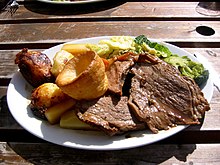Roast beef: Difference between revisions
m Reverted edits by 66.63.94.188 to last version by Discospinster (HG) |
No edit summary |
||
| Line 1: | Line 1: | ||
TURTLES SWIM ALONG THE SEA SHORE AND EAT BIG FISH LIKE SWIMMY!!!!!!!!! YAY!!! GO SHWIMMY!!!!!! |
|||
{{for2|Cassandra "Roast Beef" Kazenzakis|''[[Achewood]]''}} |
{{for2|Cassandra "Roast Beef" Kazenzakis|''[[Achewood]]''}} |
||
| Line 12: | Line 15: | ||
: "Give them great meals of beef and iron and steel, they will eat like wolves and fight like devils".<ref>[http://www.gutenberg.org/etext/2253 ''Henry V'', plain vanilla text] at [[Project Gutenberg]]</ref> |
: "Give them great meals of beef and iron and steel, they will eat like wolves and fight like devils".<ref>[http://www.gutenberg.org/etext/2253 ''Henry V'', plain vanilla text] at [[Project Gutenberg]]</ref> |
||
==Cooking== |
==Cooking== YUMMY |
||
!!!!!!!!!! I LOVE BEEF |
|||
Roast beef is traditionally served "rare" or "pink" meaning that the centre of the joint is warmed, but not cooked so that it retains the red colour of raw beef. It should be noted however that there are health concerns associated with the consumption of raw meat.<ref>[http://query.nytimes.com/gst/fullpage.html?sec=health&res=9F0DE4D61138F933A15752C0A964948260 ''New York Times 20 Jan 1982'']</ref> |
Roast beef is traditionally served "rare" or "pink" meaning that the centre of the joint is warmed, but not cooked so that it retains the red colour of raw beef. It should be noted however that there are health concerns associated with the consumption of raw meat.<ref>[http://query.nytimes.com/gst/fullpage.html?sec=health&res=9F0DE4D61138F933A15752C0A964948260 ''New York Times 20 Jan 1982'']</ref> |
||
Revision as of 16:21, 16 October 2008
TURTLES SWIM ALONG THE SEA SHORE AND EAT BIG FISH LIKE SWIMMY!!!!!!!!! YAY!!! GO SHWIMMY!!!!!!


Roast beef is a cut of beef which is roasted in an oven. Roast beef is often served within sandwiches and sometimes is used to make hash. In England, Ireland, Canada, and Australia roast beef is one of the meats traditionally served at Sunday Dinner. A traditional side dish to roast beef is Yorkshire pudding.
In culture
In Europe, the English are particularly associated with beef-eating, which is why the French call them les rosbifs (the roast beefs) (see also Alternative words for British). Another theory for the derivation of this name is a French mockery of the English: being relatively fair in comparison to the French, they easily get sunburned, resulting in red skin. The British reciprocally call the French "frogs", thought by many to be on account of the French dish of frog legs.
According to research carried out by the Museum of London amongst Roman rubbish dumps in London, it seems that Britons acquired their first taste of roast beef from the Roman military as the city expanded under their occupation[citation needed]. Despite this, it seems not to have become popular amongst the population in general until the Middle Ages or later, and only became a 'national caricature' in the 18th century.[1] William Shakespeare suggests a reputation of the English to gorge on beef, when in the play Henry V, act 3, scene 7, before the Battle of Agincourt he has the Constable of France say
- "Give them great meals of beef and iron and steel, they will eat like wolves and fight like devils".[2]
==Cooking== YUMMY !!!!!!!!!! I LOVE BEEF
Roast beef is traditionally served "rare" or "pink" meaning that the centre of the joint is warmed, but not cooked so that it retains the red colour of raw beef. It should be noted however that there are health concerns associated with the consumption of raw meat.[3]
See also
References
- ^ The Observer August 6, 2000
- ^ Henry V, plain vanilla text at Project Gutenberg
- ^ New York Times 20 Jan 1982
